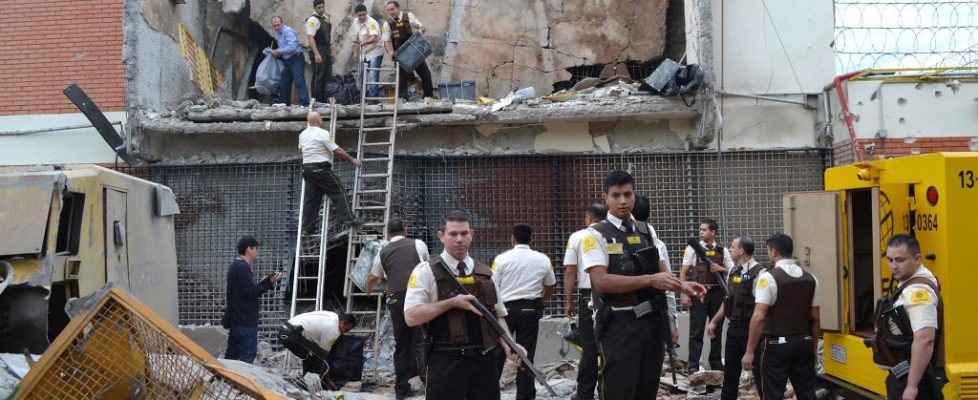Brazil’s security guards find themselves on the firing line
Brazil Sept 14 2017 In the early hours of the morning this April, residents of Ciudad del Este, a city on Paraguay’s border with Brazil, awoke to the sound of automatic gunfire and the blaring of car alarms.
In a scene straight out of Hollywood, a criminal gang was attacking an armoured-truck depot belonging to Prosegur, a Spanish security company, using explosives and assault rifles. After subduing the guards, the robbers blew a hole in the building with dynamite and raided the safes, while others set cars on fire on the approach roads to block the police.
They escaped with $40m in what Brazilian media reported was the biggest heist in Paraguay’s history, crowning a series of military-style attacks against security trucks and depots by gangs operating out of Brazil over the past two years.
The scale and violence of this attack highlight the challenge facing private-sector security companies in Brazil itself. In a country in which armed robbery is commonplace, private security guards face a constant threat. This makes maintaining a mentally and physically healthy and motivated workforce a particular priority for their employers.
“Our activity is one of high risk. It’s a highly dangerous activity in which at any moment you could take a bullet,” says Mário Baptista de Oliveira, the head of Grupo Protege, a competitor of Prosegur. “They [our staff] know that.”
There are no readily available national statistics on armed robbery, but Brazil has one of the highest murder rates in the world, at about 29 per 100,000 people in 2015, or more than 59,000 deaths. Countries use different criteria to compile their homicide rates, but to give this number some context, this far exceeds the 4.9 murders per 100,000 reported in the US in the same year.
While much of this violence takes place between the country’s so-called military police — the front-line officers in charge of maintaining law and order on the streets — and drug gangs, private security guards are also in the line of fire in the war against crime.
Over the past two years, similar large-scale raids on security-truck companies have occurred in Campinas, an important industrial and technological hub about an hour from São Paulo, as well as in nearby Santos, South America’s largest port, and further inland in Ribeirão Preto, Brazil’s sugar cane capital.
But private security officers are constantly being attacked in smaller robberies, sometimes at their depots or while leaving clients’ premises, or even while driving down motorways in broad daylight. Such attacks can have a devastating effect on employees, rendering them unable to work, according to private security workers’ unions. One union member, Luiz Cláudio Antônio dos Santos, describes an incident in which he was shot while driving an armed escort unit on the Linha Vermelha. The highway, which links Rio de Janeiro to its international airport, passes between favelas run by drug gangs, and has become so notorious for attacks that it has been dubbed the “highway of death”.
To prepare employees for such a high-risk profession, large private security companies say they are rigorous about recruitment and provide the carefully selected employees with training and generous benefits.
In Brazil, those wishing to enter the security industry must first pay out of their own pocket for an obligatory security guard training course that is certified by the federal police. Protege has a network of such schools that account for half of those trained in the city of São Paulo, according to Baptista de Oliveira.
Training is provided for employees at all levels, from doormen to armed guards. For those working in armoured vehicles there is additional training in personal security and defensive driving techniques. “This means by nature that our recruits are not just that guy who was at a loose end out there and had no other options than to work in security,” Baptista de Oliveira says.
Another critical aspect for security companies is to develop a strong culture so that employees understand what is expected of them in any given situation, from operational discipline when working in the field to personal integrity. Vera Lúcia Tavares, director of human resources at Brink’s Brasil, an arm of the US-based security company, says the company surveys staff annually to check on “their engagement with the values of the organisation”.
At Protege, all employees, from cleaners to managers, must complete an opening course on integration into the company. “No new functionary will receive an entry pass [for the front gate] until they have completed the obligatory integration module. From that the worker will know the rules, the history of the group, the group’s clients and more about the post for which he or she was contracted,” Baptista de Oliveira says, adding that there are more than 100 modules that employees can complete as their careers progress.
Founded by Baptista de Oliveira’s father 46 years ago, Protege today has 18,000 employees deployed throughout Brazil. The company has made efforts to give employees and their families a sense of belonging, helping to keep staff turnover low and maintain a motivated workforce.
The key to this is the company’s “personal development” section, a team of 20 people who run programmes in employees’ residential areas to foster skills among the spouses of workers and their children. “We have put together classrooms to promote digital inclusion, teaching them [children of staff] how to use Excel and PowerPoint and the like,” Baptista de Oliveira says.
When a traumatic event such as a robbery occurs, Protege and Brink’s say they have psychologists on hand to help employees and their families cope. The importance of such interventions cannot be underestimated.
Santos, the armed guard shot in Rio, says: “The colleague who was with me [during the attack] is still suffering psychologically. I am too. I am still traumatised today. If I hear any kind of banging sound, I think it is a shot. I stand there glued to the spot, unable to move.”



